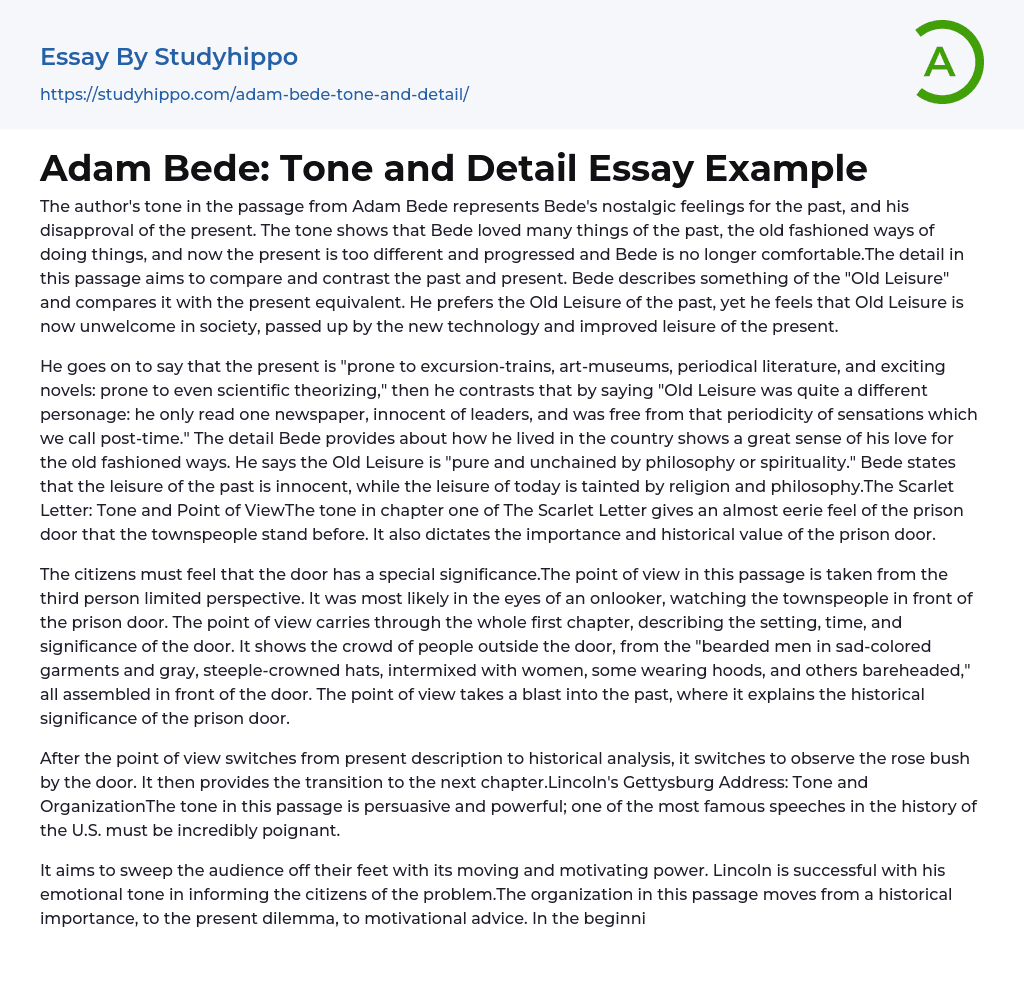The author's tone in the passage from Adam Bede represents Bede's nostalgic feelings for the past, and his disapproval of the present. The tone shows that Bede loved many things of the past, the old fashioned ways of doing things, and now the present is too different and progressed and Bede is no longer comfortable.The detail in this passage aims to compare and contrast the past and present. Bede describes something of the "Old Leisure" and compares it with the present equivalent. He prefers the Old Leisure of the past, yet he feels that Old Leisure is now unwelcome in society, passed up by the new technology and improved leisure of the present.
He goes on to say that the present is "prone to excursion-trains, art-museums, periodical literature, and exciting novels: prone to even scientific theor
...izing," then he contrasts that by saying "Old Leisure was quite a different personage: he only read one newspaper, innocent of leaders, and was free from that periodicity of sensations which we call post-time." The detail Bede provides about how he lived in the country shows a great sense of his love for the old fashioned ways. He says the Old Leisure is "pure and unchained by philosophy or spirituality." Bede states that the leisure of the past is innocent, while the leisure of today is tainted by religion and philosophy.The Scarlet Letter: Tone and Point of ViewThe tone in chapter one of The Scarlet Letter gives an almost eerie feel of the prison door that the townspeople stand before. It also dictates the importance and historical value of the prison door.
The citizens must feel that the door has
a special significance.The point of view in this passage is taken from the third person limited perspective. It was most likely in the eyes of an onlooker, watching the townspeople in front of the prison door. The point of view carries through the whole first chapter, describing the setting, time, and significance of the door. It shows the crowd of people outside the door, from the "bearded men in sad-colored garments and gray, steeple-crowned hats, intermixed with women, some wearing hoods, and others bareheaded," all assembled in front of the door. The point of view takes a blast into the past, where it explains the historical significance of the prison door.
After the point of view switches from present description to historical analysis, it switches to observe the rose bush by the door. It then provides the transition to the next chapter.Lincoln's Gettysburg Address: Tone and OrganizationThe tone in this passage is persuasive and powerful; one of the most famous speeches in the history of the U.S. must be incredibly poignant.
It aims to sweep the audience off their feet with its moving and motivating power. Lincoln is successful with his emotional tone in informing the citizens of the problem.The organization in this passage moves from a historical importance, to the present dilemma, to motivational advice. In the beginning, Lincoln informs the audience about how our nation was born, "conceived in liberty, and dedicated to the proposition that all men are created equal." Then he transitions into the present, where he informs that our nation is "engaged in a great civil war," and the nation will not be able to hold together much longer.
Lincoln
brings a ray of light into the dilemma, saying that they should "dedicate a portion of that field, as a final resting place for those who here gave their lives that the nation might live. Then Lincoln transitions into a larger sense of the predicament. He mourns the dead, admitting that he could do nothing for them except to resolve the war so that they did not die in vain. He proposes to honor these fallen heroes by introducing a birth of freedom. He says that the "government of the people, by the people, for the people, shall not perish from the earth.
- John Locke essays
- 9/11 essays
- A Good Teacher essays
- A Healthy Diet essays
- A Modest Proposal essays
- A&P essays
- Academic Achievement essays
- Achievement essays
- Achieving goals essays
- Admission essays
- Advantages And Disadvantages Of Internet essays
- Alcoholic drinks essays
- Ammonia essays
- Analytical essays
- Ancient Olympic Games essays
- APA essays
- Arabian Peninsula essays
- Argument essays
- Argumentative essays
- Art essays
- Atlantic Ocean essays
- Auto-ethnography essays
- Autobiography essays
- Ballad essays
- Batman essays
- Binge Eating essays
- Black Power Movement essays
- Blogger essays
- Body Mass Index essays
- Book I Want a Wife essays
- Boycott essays
- Breastfeeding essays
- Bulimia Nervosa essays
- Business essays
- Business Process essays
- Canterbury essays
- Carbonate essays
- Catalina de Erauso essays
- Cause and Effect essays
- Cesar Chavez essays
- Character Analysis essays
- Chemical Compound essays
- Chemical Element essays
- Chemical Substance essays
- Cherokee essays
- Cherry essays
- Childhood Obesity essays
- Chlorine essays
- Classification essays
- Cognitive Science essays




